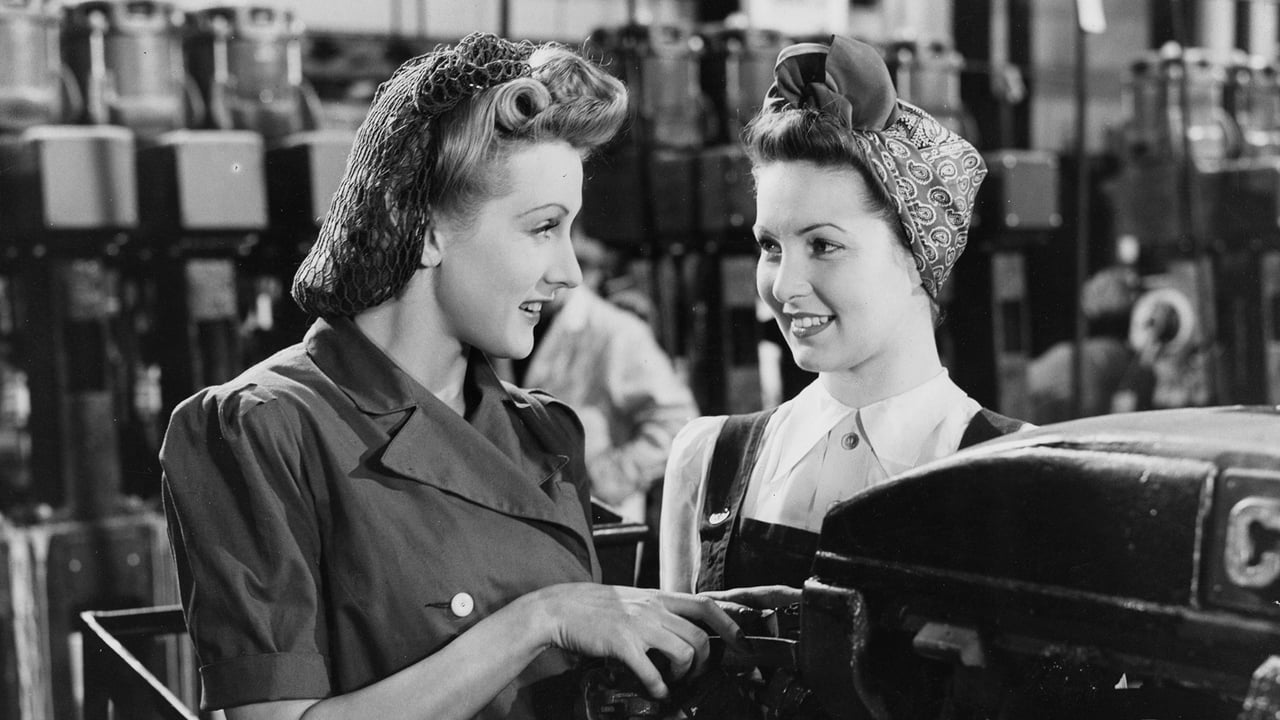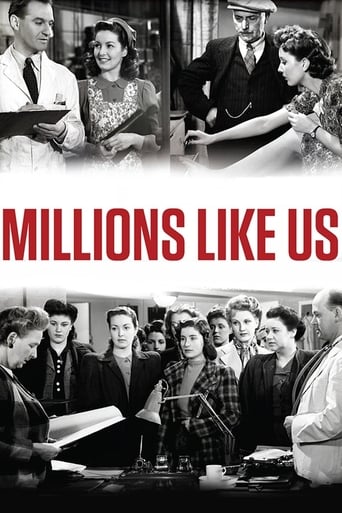2hotFeature
one of my absolute favorites!
Pluskylang
Great Film overall
ClassyWas
Excellent, smart action film.
Afouotos
Although it has its amusing moments, in eneral the plot does not convince.
MartinHafer
"Millions Like Us" is an awfully good film because it is so incredibly ordinary and simple. That's because it's goal is to provide a snapshot of what life was like for seemingly ordinary women during WWII. It follows one woman in particular, but you also see quite a bit about the other women and their lives as well--and is an invaluable documentary-like look into the WWII era.The film begins just before WWII. Celia (Patricia Roc) and her family are living a relatively mundane and occasionally annoying lives. You don't really feel particularly connected to them or care about these folks at this portion of the film. However, after the war begins, Celia is called up for service--which she is eager to do, as she hates her mundane life with her parents. Unfortunately, she is NOT called up to the women's military service but is sent across the country to work in a war production plant. While she is very disappointed, this is a great thing to focus on, since this is the sort of job MOST British (and American) working women did during the war. I could say a lot more about what occurs to Celia, but it's better you just see it for yourself. Very well done, high on realism, charming as well as sad--well worth seeing. Plus, I loved the fact that repeatedly the film COULD have been jingoistic, extraordinary and ultra-nationalistic but chose instead the more subtle and realistic route instead.
writers_reign
At the time this must have been easy to file as painless propaganda; Launder and Gilliat start off as if attempting to emulate Noel Coward's classic This Happy Breed, we are introduced to a cut-rate Gibbons family and in particular two daughters, one a flighty Queenie clone this time called Elsie (Joy Shelton) and a more grounded Phyllis, now called Cecilia (Patricia Roc) but very soon and perhaps wisely the team realise that even the two of them are light years short of one Noel Coward so they veer off into Rosie The Riveter mode and give us a picture of Women At War which is not unpalatable by any means. There are two romances both slightly improbable, Patricia Roc snags a hopelessly inept Gordon Jackson whilst second female lead Ann Crawford winds up with Eric Portman. Seen today for the first time it failed to bore or embarrass though the England depicted is on the far side of the galaxy compared to what Blair has made of it.
didi-5
One of the many war effort films Britain churned out between 1940 and 1945, this one attempted to get women recruited into industry. We watch Celia as she gets her call-up and has to leave her family to work in a factory and stay in a hostel. There she meets college graduate Gwen, flighty Sloane Jenny, and common as brass Annie, amongst others. She grows to like her job, and also finds love with a Scots flyer, Fred Blake. But this being a semi-documentary war film, things don't end up as happily as you'd hope.The cast is fine - Patricia Roc and Gordon Jackson headline as Celia and Fred, with Anne Crawford as Jenny and Eric Portman as down-to-earth foreman Charlie. There's also a bit for Radford and Wayne to do (an amusing scene where their travelling soldiers in a railway carriage get overrun with evacuees). Megs Jenkins also plays Gwen with some style and pathos. Patriotic hokum it may be, but I like the foregrounding it gives to the women (especially Jenny, who I quite like by the end of it) and the respect it gives to the factory girls and what they did for their country.
Gazza-3
Millions Like Us is one of the few films made during the 2nd World War which deals with women factory workers. When Celia gets her call-up papers she wants to do something glamorous like joining the ATS. Instead she is sent to a munitions factory.This movie is part love story and part propaganda-flic. The propaganda elements are more subtle than in many 40s films eg 'The Next of Kin'. However the life of the factory girl is glamourized. This is Celia's escape from the domestic drudgery of caring for her elderly father and allows her to find true love. Also the togetherness of the factory girls is emphasised throughout the film. The contrast between shots of Celia demure and alone that we see at the start of the film and the final scene of her as an integral part of the group is marked. Not only is munitions work vital to the war effort, we are being told, but it also provides companionship, an outlet and fulfillment for women.A film about and for women in the workplace may sound like a step forward from the usual patriarchal portrayal of the female sex. Yet, at its heart this is a deeply conservative film. Ultimately Celia finds fulfillment with and through a man and whilst the companionship of women is important, all the female characters are searching for a husband.However, the Directors should be applauded for having done a good job in making an enjoyable, informative propaganda film.By the way, look out for the shots of Patricia Roc's feet when she is talking to her husband. Is this an erotic charge or fear of chilblains? Watch the movie and let us know what you think.

